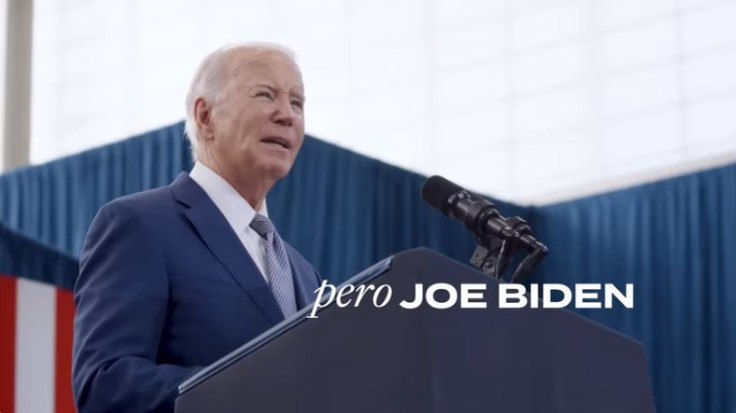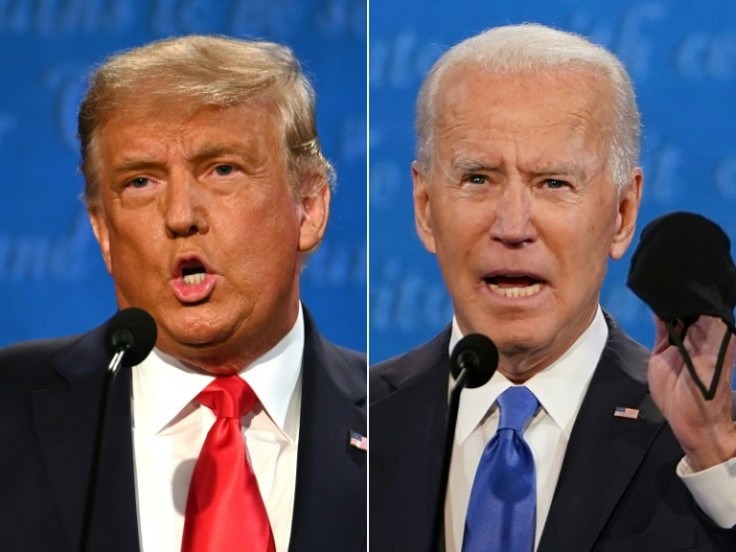
President Joe Biden's reelection campaign launched a new ad Tuesday focused on healthcare and targeting Latino voters with a message in Spanglish, the combination of English and Spanish. The ad, however, also featured some grammatical mistakes.
The ad draws a contrast between Biden and former President Donald Trump on the issue, accusing the presumptive Republican candidate of being beholden to corporate interests, and highlights that the cost of insulin has decreased under the current administration.
The video kicks off with a Spanish proverb, "dime con quién andas y te dire quién eres (SIC)" which has become an unofficial catchphrase among Hispanic Democrats during the Trump era, utilized across various platforms from campaign speeches to TV adverts.
The message is promptly translated in the video as "you are who you hang out with," before delving into comparisons of former President Donald Trump with the "big greedy corporations" in the healthcare field.
Interestingly, the ad contains two grammatical errors in the written use of Spanish expressions. First, the word "dire" doesn't have the appropriate grammatical accent (tilde, in Spanish). It should be written as "diré" to properly convey the future tense.
The second mistake is a similar one. The expression "si, verdad," should be written as "sí, verdad" in Spanish to include the appropriate accent. The word "sí" with an accent in Spanish indicates affirmation, while "si" without an accent is used for conditional statements (similar to the use of "if" in English) or as the musical note B.
The rest of the Spanish in the video is correct. As it has been doing in several ads throughout the campaign, the video includes traditional Spanglish sentences, showcasing a mix of English and Spanish that use very common words like "pero" (but), such as: "Ya sabemos. Trump is their best friend (referring to 'big greedy corporations') 'pero' Joe Biden battled the greedy corporations and won the elections and won."

"Pero" is one of the most recognizable Spanish expressions in the U.S. In fact, there is an expression frequently used by Latinos and non-Hispanic people in Miami which is "pero like" ("but, like"). It is used as a filler or a way of continuing a thought and conversation.
"(He) lowered the price of insulin for our 'abuelos' (from 'up to') $400 to $35 (...) si, verdad," follows the video, including the Spanish word "abuelos" (grandparents) this time, besides the aforementioned "si, verdad" (yes, right, in English).
Spanglish — a mix of English and Spanish — is surging in political ads and campaign outreach ahead of November's elections, as it could be "key to wooing Latino voters," who comprise nearly 15% of the electorate and could swing critical races in battleground states, according to an Axios analysis.
The use of Spanglish is growing for several reasons. First, many young Latinos, a rapidly growing demographic, are more likely to be English-dominant. This means they might know some Spanish words, but the majority are what some people might call themselves "no sabo kids," meaning they don't completely master the language.

About 63% of Latinos say they speak Spanish and the percentage who speak Spanish at home has declined over the past decade, according to a study by the Pew Research Center.
"Second-generation Latinos in the U.S., at home, while their parents and grandparents are speaking in Spanish, they're speaking in English back to them," Biden's campaign spokesperson Fabiola Rodriguez.
According to Axios, while during the 2020 campaign Biden released just one ad in Spanglish, in the 2024 elections he has already launched two. The first one, eight months ago, focused on education and businesses.
"Biden doesn't fight for 'los ricos'. He fights for us," the voiceover says in this case, "los ricos" meaning "rich people."
Meanwhile, the Trump campaign, which has also released Spanish-language ads for 2020, hasn't spent any money on them so far this cycle. Instead, the former president is reaching out to Latino voters organically, doing interviews with Spanish-language TV stations, and extending the campaign messages through surrogates such as Sen. Marco Rubio, a spokesperson told Axios.
Launching Spanglish ads can be a risky choice, experts say, because if not well done, they can easily come off as parody.
"I think when people are saying that we should do more Spanglish, I think they're just saying we need more ads that speak culturally to the audience, that understand that the audience wants to feel included," Carlos Odio, co-founder and senior vice president for research at Equis Labs, says.
"It's important to highlight that the Latino community is the community that receives the least funding for anything related to civic participation and democracy," says Héctor Sánchez Barba, president of Mi Familia Vota, as quoted in the Axios article.
© 2025 Latin Times. All rights reserved. Do not reproduce without permission.






